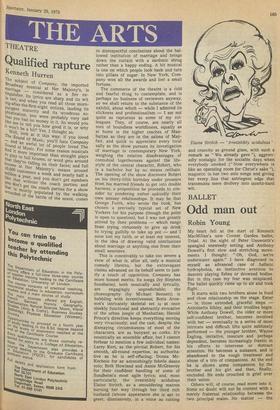THEATRE
Qualified rapture
Kenneth Hurren
The subject of Company, the imported Broadway musical at Her Majesty's, is marriage — considered as a fire extinguisher. Its lyrics are sharp and its wit is tart, and when you read all those morntog-after-the-first-night notices, lauding its Pungent maturity and its wondrous so thphistication, you were probably very sad at you had no money in it. So would you like me to tell you how good it is, or why won't be a hit? Yes, I thought so. Well, look at it this way: if you loved The Sound of Music, you'll hate Company --and an awful lot of people loved The Sound of Music. For some reason musicals find it more important than straight plays to play to full houses, or word gets around that they're falling on their faces; and full houses at Her Majesty's means around 1.0,000 customers a week and nearly half a m..‘illion a year, and you don't get numbers lute that without the coach parties; and Y,_01.1 don't get the coach parties for a show that is mostly populated by the walking Wounded of the battle of the sexes, comes to disrespectful conclusions about the hallowed institution of marriage and brings down the curtain with a sardonic shrug rather than a happy ending. A hit musical is one on which people look back and turn into pillars of sugar. In New York, Company won all the awards and lost a small fortune.
The commerce of the theatre is a cold and fearful thing to contemplate, and is perhaps no business of reviewers anyway, so we shall return to the substance of the exhibit, about which — while I admired its slickness and professionalism — I am not quite as rapturous as some of my colleagues. They, of course, are nearly all men of boundless worldliness, equally as at home in the higher reaches of Manhattan as they are in the salons of May fair, and quick to appreciate every local sally as the show pursues its investigation of marriage in contemporary New York, weighing the relative disadvantages of connubial togetherness against the lifestyle of the central character, Robert, who is a bachelor but by no means celibate. The opening of the show discovers Robert on his thirty-fifth birthday under pressure from his married friends to get into double harness, a proposition he proceeds to con sider by pondering rather unkindly their own uneasy relationships. It may be that George Furth, who wrote the book, has chosen a precisely typical set of New Yorkers for his purpose (though the point is open to question), but I was not greatly stirred by their problems — which range from trying virtuously to give up drink to trying guiltily to take up pot — and I soon lost my faith, or at least my interest, in the idea of drawing valid conclusions about marriage or anything else from their small neuroses.
This is conceivably to take too severe a view of what is, after all, only a musical comedy libretto, but the extravagant claims advanced on its behalf seem to justify a touch of opposition. Company has more honest merits. Its songs (by Stephen Sondheim), both musically and lyrically, are engagingly unpredictable; the choreography (by Michael Bennett) is bubbling with inventiveness; Boris Aronson's intricately skeletal set is at once sleekly functional and abstractly evocative of the urban jungle of Manhattan; Harold Prince's direction keeps everything moving very vivaciously; and the cast, despite the dismaying circumstances of most of the characters, are as buoyant as corks. It's essentially an ensemble affair, but I cannot forbear to mention a few individual names: Larry Kert, as the pivotal Robert, for his smooth, all-round expertise, as authorita tive as he is self-effacing; Donna McKechnie for an astonishingly febrile dance solo; Beth Howland and Annie McGreevey for their confident handling of some of Sondheim's most agile lyrics; and, most particularly, the irresistibly acidulous Elaine Stritch, as a smouldering matron burning her way through her third rich husband (whose appearance she is apt to greet, dismissively, in a voice as cutting and crunchy as ground glass, with such a remark as We already gave "), aggrievedly nostalgic for the sociable days when everybody smoked (" Now everywhere is like an operating room for Christ's sake "),. magnetic in her two solo songs and giving her every line that astringent edge that transmutes mere drollery into quartz-hard wit.










































 Previous page
Previous page